- From Faith Current: “The Sacred Ordinary: St. Peter’s Church Hall” - May 1, 2023
- A brief (?) hiatus - April 22, 2023
- Something Happened - March 6, 2023
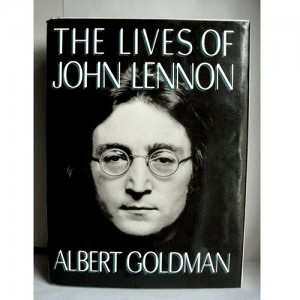
“What’s the creepiest photo you have?… Yeah, that one.”
This is a two-part news program from 1989, where the author of the muckraking “The Lives of John Lennon” (just released at that time) debates Hunter Davies, the author of “The Beatles” authorized biography from 1968. Davies is very charming, and makes some very good points about Goldman’s tendency to veer off into—well, the nicest thing to call it is “creative writing.” I think that’s exactly how any sensible person should read it; at points Goldman stops writing about the real John Lennon, whoever he was, and begins crafting a character he’s calling “John Lennon.” Meticulous research aside, Goldman presumes; he invests his personal impressions with the weight of conclusively proven facts, and any reader with the tiniest pinch of sympathy resists that. Goldman bios, whether of Lenny Bruce or Lennon (I haven’t read Elvis), are a type of New Journalism that, while valuable, isn’t quite successful.
Goldman counters by saying that Davies’ book was authorized and thus sanitized. This is beyond debate; Davies was compromised, and while it’s naive to blame him for it, it remains a flaw in his book. The human folly of it all is simply this: at the time everybody’s still alive and everything is fresh and “the real story” is still possible to be pieced together, the forces working against truth — ego, embarrassment, propriety, legality — are also at their strongest.
Davies is a bit disingenuous in his defense, but one can understand why he (and his publisher) did not want to cede the field entirely to Goldman’s new book. As a lover of history, biography, and The Beatles, I was fascinated. Apart from the rest, there is the issue of personality: while both men make fair points, Goldman presents himself in such an off-putting way—so arrogant, overbearing, and dismissive—that any agreement is painful. Explains a lot why people hated his books so much. (Though not everyone; I recall reading somewhere that both John and Paul had read his bio of Elvis, and liked it.)
POSTSCRIPT: I watched a whole OTHER documentary for this post, one from BBC4 in the late 80s called “Lennon/Goldman: The Making of a Bestseller,” which promised to examine the issues of celebrity, biography and commerce in-depth. I’m really interested in all those issues, but the doc ended up being underwhelming (probably because Goldman pulled out at the end). Look it up on YouTube if you’re interested; Bob Spitz (a friend of Goldman who would later write a large biography of The Beatles) makes some interesting points about how rock journalists cannot risk telling the truth about their heroes; Robert Christgau also has some compelling things to say about Goldman’s biases and the nature of popular culture. And there’s a psychic—and a flamboyantly gay interior decorator—that are both great set-pieces, too.

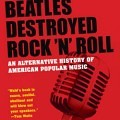
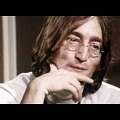
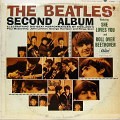
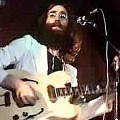
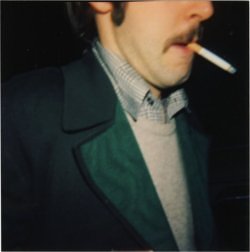
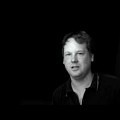
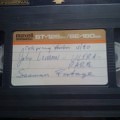
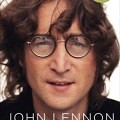
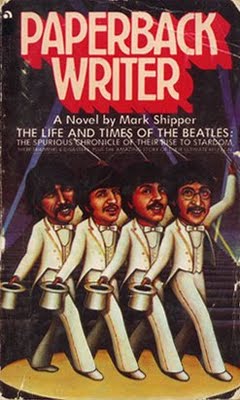
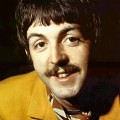
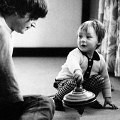

Hi again! So is Goldman’s book worth my time? Davies’ book seems interesting as a time capsule, but Goldman’s? I’ve been told it’s a hatchet job but fascinating.
Thanks. 🙂
That was interesting. Thank you.
Elise, I have complicated feelings about the Goldman book. I think, if one reads “Lives” in the right way, it can be really illuminating. However, what is revealed is pretty painful if you have any emotional investment in the conventional view of John Lennon.
By “read in the right way” I mean skeptically but openly, filtering the mass of valuable first-hand information through the skewed nature of the sources (given the author’s rep, only negative people would speak to him), the commercial need for dirt, and Goldman’s Grand Guignol tendencies.
So why read it, if you have to work so hard? Because with a topic like The Beatles, the distortion is likely to be positive, rather than negative. We’re fans; we LIKE the guys. And the media makes much more money out of selling stuff to fans than to detractors, so they pass on the PR and skew even more positive. Lennon himself mentioned this tendency many times, and I think it got into his head. (Details upon request.)
One must also keep in mind who yelled the loudest when “Lives” came out: Yoko Ono (who indeed comes off terribly) and Rolling Stone and the rest of the “rock establishment” circa 1988. Both of these groups had (and to some degree have) an immense financial interest in keeping a certain version–and ONLY that version–of the Lennon myth alive. Just like Goldman had a financial interest in playing up the negative side. So to me, that’s a wash.
Frankly, I think it’s a good idea for any Beatles fan past the impressionable stage to read Goldman, and Peter Brown, and anything else that adds darkness to the picture. First because it might make them less susceptible to PR and the cult of celebrity (an essential skill in our world), and second because it might help them see how damaging mega-celebrity is to human beings. And then, one hopes, learn to express their affection for people they don’t know in intelligent, compassionate, non-destructive ways. The “masscult” phenomenon is a very powerful thing, and the better our culture gets at stirring it up, the smarter individuals need to be about it.
I don’t believe Goldman any more than I do Coleman or Norman (or Shotton or Pang or Twist or Green or Seaman or Rosen), but I think John Lennon IS in there somewhere, and it’s harmless intellectual fun to try to find him. To me, books like Goldman’s don’t destroy the good that John Lennon did–either musically, or culturally. They in fact make his positive acts that much more impressive to me, because I suddenly perceive all the forces pushing him in the other direction.
If you read it, I’d love to hear your thoughts, Elise!
Thanks for that, Michael. I’d love to read more.
Are you saying that a lot of his problems were fan related?
And are the major points of contention Epstein, Sutcliffe, and Yoko? I feel as though I need an outline just to start the thing.
I’m almost finished with Many Years From Now, and need something else to read in the evenings. I’ll drop a line if I can when I’m done.
Elise, I’m re-reading Many Years currently for TheDailyBeatle tweets. Do you like it? I always have.
Without going into novel-length, what I mean is that John Lennon had plenty of stuff to work on, psychologically speaking, without the distorting aspects of wealth and mega-celebrity being put on top of that. His wealth and mega-celebrity kept him from really addressing the bedrock stuff he needed to fix–his parent stuff, his substance-abuse stuff, perhaps even bipolarity. Whenever he’d attempt to address these issues, say with TM or Janov or things that are not public, sooner or later the wealth and celebrity stuff would thwart that process.
Imagine for a second always being the center of attention; people constantly currying your favor and telling you whatever they think you want to hear; everyone you meet offering you drugs, sex, or both; everyone thinking you have the power to fix all their problems; imagine every time you tell someone YOU have a problem, they think you’re whining…The list is endless, and taken together, they’re really tough to navigate without totally losing your grip on reality, much less yourself.
Also, when you’re famous on the scale of a Lennon, you have to deal with a) people simply refusing to acknowledge actions/statements by you that do not fit their image of you and, b) this image being created and controlled by other people desiring to make money “off” you. Person X thinks a piece of gossip about you will sell newspapers, so he/she writes it. Then that true, partially true, or completely untrue thing becomes part of your “persona,” to be dealt with by you for the rest of your life.
Does that make any sense? It’s a complicated issue, and one fans of all sorts are encouraged not to think about. But if we really care about the objects of our devotion, I think we oughta.
I’m enjoying it quite a bit actually. It seems like a book I’ll be revisiting in the future. (The Avant Garde stuff does bog it down.)
No, that makes sense. You were talking about the groupies and hangers-on and I was thinking screaming girls. That would be rather crushing. I guess they were always expected to be on.
So is there anything on whether or not he was bipolar? Or dyslexic? I’ve had that impression, but I assumed it was just me reading too much into it.
Elise,
This is a perfect time to test out your Goldman-goggles!
Paul makes a big deal out of his avant-garde activities because, for twenty years, LENNON was the avant-garde one and Paul was the lightweight. That was the “persona,” created by things like Rolling Stone, that Paul had to contend with–regardless of the reality. So Paul’s ego/sensitivities on this topic skewed Many Years From Now.
Did Paul say to Miles, “Hey, let’s emphasize this?” Perhaps. Or did Miles, being Paul’s pal, sense that by emphasizing it, he’d please Paul and thus stay in the king’s good graces? Perhaps. Does the emphasis suggest that Paul was touchy about his status as a Serious Artist? Yep. It that CRAZY, because Paul’s one of the most successful and respected musicians of his generation, obviously an absolute genius? Yep.
Much of what is said and not said in a biography a matter of psychology, and not history. Biographers choose facts, and in that choice create a character with their subject’s name.
I don’t know what Lennon thought of screaming girls–I’ve read that he disliked crowds–but he’s pretty consistent on what he thinks of groupies and hangers-on. (That was Yoko’s masterstroke, btw, being the opposite of a groupie.)
As long as Brian was alive, Lennon was pretty good at steering clear of leeches. Neil and Mal were nothing if not loyal; ditto with Peter Brown and Derek Taylor; Brian may have done some bad deals, but I don’t think there’s any question that he loved and tried to protect the four of them.
But starting in ’67, Lennon’s self-protective judgment gets seriously faulty; he’s either super-paranoid, or super-open. The Maharishi is either The Answer or a Total Fraud. People like Pete Shotton are replaced by people like Alex Mardas.
I suspect that too much acid had something to do with this, but that’s a theory; we don’t know what that much LSD does to the brain. Surely Lennon’s drug use in general must’ve put him into contact with some dire individuals, especially in the Seventies, when he didn’t have a much of a “screen.”
In any event it’s pretty clear that Lennon’s ability to judge friend from foe decayed for the rest of his life–resulting in the tragic circumstances we all know.
Lennon sneeringly referred to the period of ’64 to ’67 as his “Fat Elvis” period, but that individual was more functional, less alienated, and much more connected with others than either the Lennon of the Lost Weekend or the Dakota days. Something happens to Lennon in the Seventies that just doesn’t make sense. I find it very, very telling that Lennon was not shot in ’66 after the “Jesus” comment, when there were clear reasons for him to be afraid (I recall reading something about Red Rocks that was simply chilling), but in 1980, when they’re weren’t. What I think it may mean…well, you’ll have to read the novel(s, if I do this sequel in my head). It’s complicated, and paranoid, but a good read, I think.
My impression was that was Miles’ big part in the story, so he felt the need to expand on it. As for Paul, well, when it goes from Lennon and McCartney to St. John and what’s his name, you’re going to get a bit defensive.
I don’t see how using that much LSD wouldn’t have a permanent effect.
I guess I need to find myself a reasonably priced copy and judge for myself.
Yeah, get yourself a used copy and dig in!
I think that makes sense about Miles, too.
The thing about LSD is, it being illegal since 1966, we simply don’t know what “1,000 trips” over the period of 24 months might do. There were probably some CIA-funded studies on that, but they were likely burnt in 1973.
I think we can be pretty sure that basting one’s brain that thoroughly might cause some definite personality changes…which were noted in Lennon in that period. The conventional story is that all the changes were positive–before 1967, Lennon didn’t even VOTE–but I think that’s a bit naive. Everything has positives and negatives, and Lennon’s experimentation with drugs is probably no exception. He started out very complicated, and life and his choices made him even harder to fathom.
Enjoy (?)–and please let us all know what you thought!
BTW, Elise, I didn’t mean that YOU were being naive, just that the conventional view of Lennon’s experimentation does not sufficiently address the possibility of biochemical changes.
Alcohol changes brain chemistry. So yeah, anyone thinking LSD wouldn’t change anything? Naive. 😉
Another thought provoking post and comments section Michael! As usual I will go away and ponder this.
For the moment I’m just chuffed that I managed to sit through Goldman’s interview without my head spinning off. It’s a start! 🙂 But I don’t feel I’ll be spending what precious time I have on this earth on Albert’s tome. I know about John’s less than saintly character traits, and some of his more cruel behaviour during his lifetime. Am I really going to learn anymore about the artist behind the man by reading Albert’s book? I would need more convincing on that point. In the meantime, will go back Many Years From Now for a re-read I think 🙂
I did think he made some excellent points about the nature of biography though.
shirley
x
To spend the time and effort writing someone else’s life story requires a huge investment in that person, so no biography can be without bias. That makes it important to read biographies from people with different biases in order to get a more complete picture.
I think Goldman’s book is valuable for the reasons you suggest, Michael — it does get at the darkness in a way other writers about Lennon don’t. And that the darkness was there throughout his life, who can doubt? I agree that it adds to Lennon’s achievement that he was able to achieve what he did despite the burdens he had. At the least, Goldman’s book is a counterweight to the veneration of John that actually hollows him out and creates a new myth in place of the old “dream.”
Excellent point about Yoko as an “anti-groupie.” Peter Doggett gets at this in “You Never Give Me Your Money” when he says that the Beatles could take each others’ most withering criticisms but were powerless in the face of Yoko’s apparent boredom in the studio. His book is one of the smartest ever written about the Beatles, in my opinion — he’s able to combine great love for their music with a clear sighted view of them as people (very young people, really!) pulled and warped by money, fame, drugs, and internal tensions. Rather painful reading at points, but very illuminating.
Nancy, it’s as if you read my mind on this topic (or I read yours, in which case the scissors are under those papers by the phone, you’re welcome). I think you might really enjoy this “Beatle noir.”
It’s fascinating how fans read Brown or Goldman (and perhaps Doggett) and get angry at the dirt, rather than marvel at how little dirt there apparently is, given that
a) these guys were under 30;
b) they were totally unprepared for fame, and nobody’s prepared for THAT level of fame;
c) the people assigned to screen them/help them/manage their affairs were likewise young, unprepared, and making it up as they went along.
All this taken together makes their story, to me, almost miraculous.
If one compares the Beatles’ story to that of their contemporaries–say, Morrison–to say nothing of later groups like Zeppelin or Motley Crue, one is left marveling at how fundamentally decent and sensible the four of them generally were. Not perfect, not boring, but 99% of the time recognizable as people, not as rock gods/monsters.
I gotta read this Doggett book; it sounds fantastic–how did you get a copy?
You really must read “You Never Give Me Your Money” — I ordered a copy from the UK last year, because it wasn’t in print here yet. It’s due to be published in the U.S. on June 8. Doggett wrote an earlier book on the “Let It Be” and Abbey Road” albums, which I liked, but the new book is great.
He’s very good about clarifying when he’s stating facts and when he’s giving his opinion. He doesn’t seem to take delight in uncovering dirt, but feels a duty to the whole story. There was new information (well, new to me, anyway) about the day-to-day realities that led up to the breakup that made me rethink things, as Shirley describes doing after reading that note by George.
I came away from the book wondering how differently things might have gone if only one or two things had been changed. To take one example, if Jane Asher had been with Paul in early 1968, I can’t see him acting out in quite the way he seems to have. I think Paul felt abandoned because John was so much with Yoko, while Jane was away, and he did some passive-aggressive things that quite reasonably angered John (and help explain Yoko’s antipathy toward Paul). At the same time, John did the HUGELY passive-aggressive thing of having Yoko present in the studio and changing the unwritten rules on the rest of the band, and then being angry when they didn’t take to that.
Definitely a book for anyone who likes to think too much about the Beatles!
Love reading your comments Nancy, will try and get a copy of the Doggett book asap too. So little time and so many beatle books!
shirley
I decided to borrow a copy from the library. We’ll see how it goes. :-/
“Sanitised” and “compromised” Hunter Davies’s book may have been, but in the days before Beatles songs were recognised as “precious jewels” by the Catholic Church, his biography provided ammunition for at least one cleric of my acquaintance in what amounted to a religious war, as recounted here:
http://sweetwordsofpismotality.blogspot.com/2010/01/doo-wop-dialogue-68.html
If you’re still reading this Michael, I’m two or three chapters short of finishing the book, but I am not sure that I need to read them – Yoko in Love was enough to bring everything in focus.
I’m almost afraid of the conclusion I’ve drawn. 😀 Do you mind if I use you as a sounding board?
Elise, I’d love to hear what you’re thinking about the book, if you’re willing to post it here.
Elise, I’d love to hear what you’re thinking about the book, if you’re willing to post it here.
Ok Nancy, you asked for it. Here’s my half-baked theory. 😉
Well, until that point in the book, it just didn’t make sense. First, Goldman seems to have been completely sold on Marnie Hair’s account of events. From what I’ve read, she’s pretty much the only source he defended. Second, why would someone like Yoko, who Goldman describes as secretive and manipulative (and Oriental!), spill her guts to a woman she met on Sean’s play dates? Really, they spend all this time building the MYTH, and then she risks destroying it all by casually mentioning to Marnie Hair that her husband is a murderer and a rapist. (More tea?)
The only conclusion I could draw is that Ms. Hair believed what she was saying, and Yoko did tell her these stories. Why? So when she divorced John, she would get more money and custody of Sean. She started a whisper campaign. But when John was murdered and she had adopted the role of grieving widow, it was too late to take it back.
I’m not saying I believe this, but it’s the only thing that made sense if it wasn’t all lies. And to be honest, I gave up on the book after that. It was taking too much energy. If I missed something crucial, please let me know.
Thanks, Elise — very interesting. I haven’t reread the whole book recently, but I see what you mean about wondering why Yoko would make such comments to Marnie Hair. Yet I also wonder about the pressure, on both John and Yoko, of the MYTH they were living with. In 1980 they were getting ready to reemerge as a duo, in musical, public form, and there must have been a lot of tension associated with that.
In sum: Goldman’s book does take a lot of energy, and he says things I can’t believe, yet I find him valuable for his willingness to take on the contradictions and implications that others don’t. And I’ve enjoyed hearing your thoughts about it very much.
Nancy: certainly true about the pressure of the J&Y myth. Not a pressure I would ever, ever want on any relationship of mine, friend or lover, public or private.
The thing that I find fascinating about the J&Y meme is that it was generated, and then assiduously maintained, by them. It’s one thing for John to complain about how the “lovable moptop” identity was imposed upon him–that it was a lie, designed in part to make money, and that it constrained his true nature–but then he turns right around and creates another media cartoon with his wife! Could not the same things be said about the J&Y meme as Lennon said about the moptop one, especially by the late 70s, when Lennon was working on a Broadway version of their story? Motivations aside, is it not the exact same kind of hollow manipulation?
Moptop or half of JohnandYoko, Lennon lived his entire adult life within (or behind) a “brand.” Why he would choose to do so, especially after the Beatle experience, seems a central question–but one that never gets asked. I’ve worked out some answers en route to doing this book, but they are surely debatable. But glossing over this paradox is one of the reasons that the Estate’s view of Lennon is so unsatisfying to me.
I suppose that could be the case. I would have expected her to open up to her psychic about these things and not a neighbor. It just seems stupid and I haven’t heard anyone accuse her of being stupid.
We’re presented with two extremes: they LOVED each other or they were going to kill each other. The truth is some where in the middle. With such strong personalities, I could imagine some incredible fights. But do fights always lead to divorce?
I’ll probably have to revisit it at some point myself – after I read Shotton’s, Peng’s, and Cynthia’s accounts. Right now I’m relaxing with I Me Mine, which is light on drama.
Thank you for taking the time to discuss this with me. You’ve given me something new to think about.
Michael, I couldn’t agree with you more about John’s helping build the J&Y myth, and how that doesn’t square with the image of him the Estate offers. Why he needed a larger-than-life mythos — one that, importantly, was shared with someone else — is a key question to any understanding of him. It’s as if, with the Beatles’ group identity gone, he couldn’t wait to build another identity with Yoko, even though it was, in my opinion, just as carefully constructed and constricting.
I continue to be fascinated with why Paul has generally taken the heat for wanting to be a rock star, having his wife in a band, and caring about his image (Phillip Norman is especially scathing on all this), while John seems to be doing something essentially similar. John wants to be a prophet and present his wife as a co-artist with whom he shares an idyllic relationship. As you point out, he and Yoko decided to enact their marriage publicly and make it a subject of interviews — I keep thinking it’s rather like reality television before reality television. Which isn’t to say that their relationship was false or that they didn’t love each other, just that their relationship and ways of interacting with each other are far more complicated than gets commonly acknowledged.
So, in sum, I should really read your book!
And Elise, you’ve given me a lot to think about too.